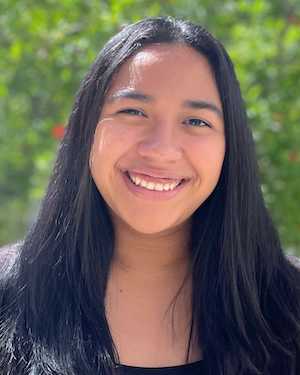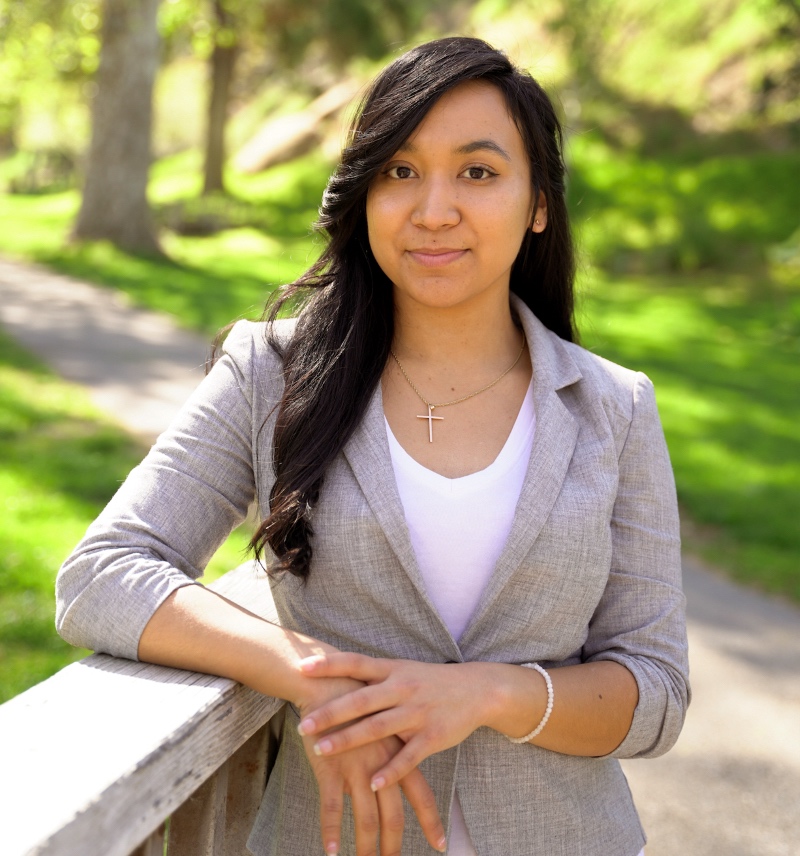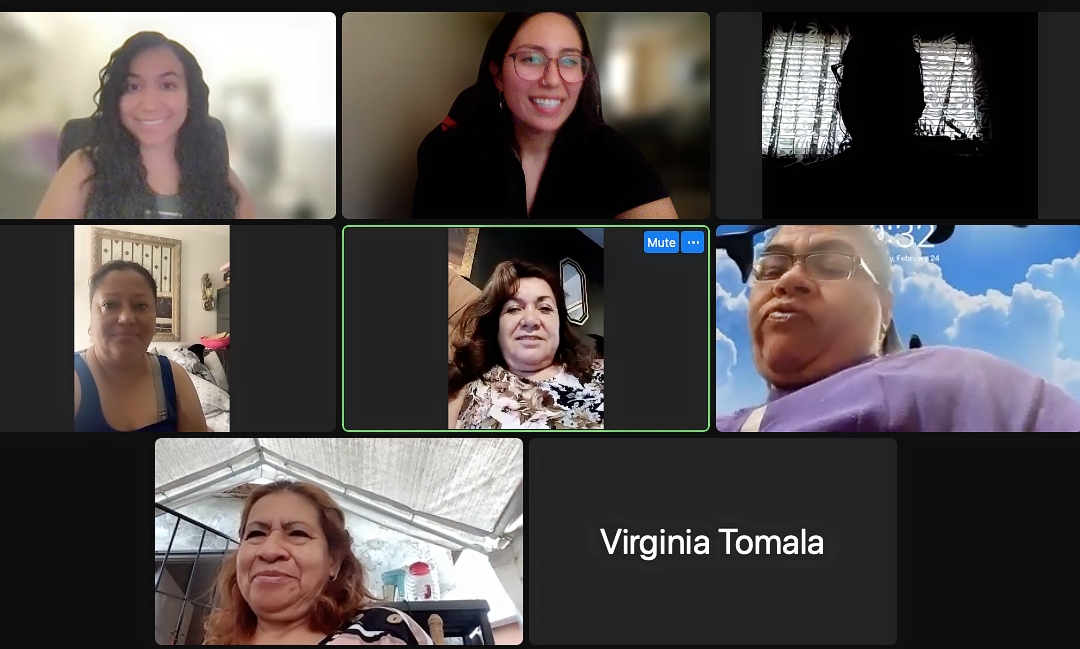Student Blog
Andrea

This Summer with the Community ⟩
August 12, 2022, by Andrea
Community Diversity Getting Involved
Throughout this summer I was able to volunteer in the Vivir con Diabetes and Vivir con Dolor programs. Alongside the guidance and leadership of current OT residents Daniela Flores-Madriaga and Elaina Rodriguez Garza, we were able to reach Spanish-speaking community members to help educate those with chronic conditions.
During my time as a volunteer, I helped lead discussions, exercise activities, and educate about habits and routines to participants. The education and culturally sensitive strategies through a lifestyle redesign lens provided by Daniela and Eliana helped support the journeys of participants with diabetes and chronic pain.
Daniela shares her experience with Vivir Con Diabetes as a rewarding experience that has shaped the way she interacts with chronic conditions. One of the biggest lessons she learned in facilitating these classes was to be attentive to the needs expressed by the participants. She found that “in order to make an impact in their lives, I had to provide strategies that were reasonable and applicable to fit their routines, habits, and roles.”

Elaina Rodriguez Garza
Since 2019, Elaina has volunteered to be a part of Vivir con Diabetes. Like myself and Daniela have expressed Eliana has found fulfillment in the program. “Not only is it an opportunity for me as a facilitator to connect with community members, but it is an opportunity to facilitate new connections between community members and create a space for them to bond over shared experiences living with diabetes and navigating problem-solving barriers around their health,” Elaina shares.
What is unique about the classes is the accessibility for community members to ask facilitators slightly more tailored questions they may not be able to ask in their primary care appointments. The tight community within these classes is something I found beneficial not only to myself as a volunteer but to participants as well. For example, during one of our classes on physical activity, I modeled examples of low-intensity exercises and lead a group discussion on participants’ current physical activity. In our discussion, a participant expressed their desire to walk more but is limited due to their arthritis. Another participant shared another program offered by the wellness center that can help their concern with exercising. Such interaction demonstrates the collaborative community fostered through the program.

Being a part of this program this summer was a learning experience, one that allowed me to observe OT in practice and for us to tangibly serve our community.
⋯

So What Now? ⟩
July 29, 2022, by Andrea
Classes First-Gen Getting Involved What are OS/OT?
So you just discovered OT. Maybe your overly excited roommate shared with you the major or you heard about the amazing occupational science minor classes, like Creativity Workshop from a classmate. No matter how you discovered OT, the field piqued your interest.
Now you may ask yourself, how can I learn more about OT and/or get involved at USC as an undergraduate student? Well, here are some ways you can do just that!
Pre-OT Club
The Pre-OT Club is a great way to learn more about OT through presentations, networking opportunities and guidance from current OT faculty members. The club is open to all USC undergraduate students interested in OT. From collaborations with other health profession clubs on campus to providing advisement for applying to OT graduate school, the Pre-OT club explores ways to dwell deeper into the field of OT.
OS Minor
Whether you have extra units, are ambitious to pick up a minor or are committed to applying to OT graduate school, pursuing an OS minor may be the right choice for you. Minoring in OS prepares you for the career of OT as well as exploring its uniqueness and versatility. Classes like Doing Social Justice and Creating a Sustainable Lifestyle are some examples of such versatility and how anyone can find their path to OT. I never miss an opportunity to recommend an OS class to my friends looking for a fulling class. One of my favorites to recommend is OT 100: THRIVE: Foundations of Well-Being. I took OT 100 online as a freshman and was able to foster vulnerability with my small group as we explored what it meant to thrive in all aspects of life. It’s a great course to learn more about well-being from an OT lens!
Volunteering
Getting hands-on experience is a great way to further your understanding of OT and the daily tasks of a therapist. Because of the many settings OTs can work in, consider volunteering at various sites and/or with different populations/communities. Click here to find a site!
Networking
The “Trojan Family” doesn’t just describe the relationships you build with other USC students, but also the relationships between faculty and students. Consider conducting an informational interview with a faculty member. After a coffee chat or zoom call, speaking with a current OT professional can provide you with relevant information about working in OT, expand your knowledge of the unique pathways, and provide guidance to your journey in OT. One of the ways I was able to network with USC Chan alumn was through the Trojan Network. During my time in the first-generation mentorship program, I was able to connect with current OTs who shared with me their journey to OT and her advice. Alum, Dr. Joyce Yoo, shared with me the importance of getting to know my colleagues and peers “as they are peers as they too are doors of future opportunities.”
In short, your journey to OT doesn’t start at the graduate level! The opportunities here at USC allow you to pursue OT at any point in your undergraduate experience.
As an undergraduate student myself, a rising junior in the BS-OTD program, I love to talk to other students about my passion for OT and always pitch the idea of exploring OT for themselves. If you need any more convincing, let’s have a chat!
⋯

Learning and Applying ⟩
July 15, 2022, by Andrea
Diversity First-Gen Getting Involved What are OS/OT?
Coming to USC, specifically to USC Chan, my passion for OT grew as I became more immersed in my classes and the opportunities for learning more about the profession. One of the ways I was able to explore my desires as a professional was through the Summer Institute.
I attended the Summer Institute in the summer of 2021 in the hope of gaining a clear direction in my journey as an OT student and exploring the unique disciplines. Throughout the six weeks, we explored our goals academically and professionally, gained mentorship, and the ways in which we can reduce health disparities in minority populations.
The most impactful week for me was when we held a student panel. It was a space where current students provided honest insight into their journey into OT as it related to their identities — first-generation and/or POC. Hearing from each panelist about how they were introduced and came to love their professions was definitely a highlight. The diversity in their journeys was a reminder that everyone has their own set path.
Some aspects that I continue to utilize even after the program are the tips on how to seek mentorship and professional development. Seeking mentorship can be a daunting task, but I was able to understand that it can be a process. It’s not always that the first person you cold email will respond. Being a mentee in any program requires flexibility, following up, and good communication. I utilized these skills in my sophomore year in the USC First-Generation Mentorship Program with my own mentor which better prepared me as a mentee. Learning how outreach to OT professionals was a skill I gained confidence in.
As the current cohort for the Summer Institute of 2022 is in the midst of their program, I encourage you to invest in fruitful connections within your cohort and faculty. Each person in that zoom call has a passion for OT and the ways we can impact our communities. Through my experience in the Summer Institute, my passion for serving the Latinx community was solidified and my confidence in my own journey was strengthened. The growth and learning don’t stop at the end of the six weeks, instead, it only marks the beginning of your journey as a healthcare professional.
Fight On!
⋯

How Shadowing Led Me to OT ⟩
June 29, 2022, by Andrea
From a young age, I always knew I wanted to help people, and one of my greatest influences when pursuing a career in the medical field is my grandma.
My grandma immigrated to the United States from El Salvador in 1971 in hopes to advance her career as a nurse in the States. Even with little knowledge of the language, a new culture, and with minute support, my grandma was successful in her dreams. Over the next decade, my grandma has worked towards her aspiration and she became a registered nurse in the States in 1983.
Her heart for serving people is something I deeply admire. Whether I understood my admiration for her at age seven or not, my actions often reflected her work as a nurse. My sister and I would pretend to play “doctor” using each other as patients and as I got older, I would listen intently to her as she explained some of her fieldwork like checking blood sugar, or blood pressure.
You could probably guess the shock on my grandma’s face when I broke the news to her that I didn’t have an interest in following in her footsteps as a nurse. Despite this new revelation, I knew I still wanted to be in the medical field — what that looked like, I didn’t exactly know.
On my journey to discovering occupational therapy, I first settled on a possible career in optometry. I wore glasses since kindergarten and my yearly visits to the optometrist were always pleasant so this decision seemed the most practical. However, optometry didn’t ignite enough passion in me so soon this idea faded away.
Throughout high school, I took classes that would benefit me in a future career in health care. In my junior year of high school, I shadowed at a pediatric occupational therapy clinic. I shadowed the therapist throughout the day and after each patient, she would talk through her work, the fundamentals of OT, and how they applied to the activities I observed in her sessions. I appreciated her patience with my little knowledge about OT as she took her time to explain. Her passion for her work and care for her patients were infectious. During my time at this clinic, no other career path had sparked such joy and ambition in me the way occupational therapy had. After my shadowing experience, I was set on a career in OT. OT encompassed the values of patient care and a holistic view of health care.
With this new revelation, I applied to USC’s BS-MA occupational therapy program (now BS-OTD). As I enter my third year in my program, I continue to learn about the vast variety of specialties and the work OTs do. Through Chan’s many opportunities to get involved, even as an undergraduate student, like the OT/PT Summer Institute and the Vivir con Diabetes program, I have found enthusiasm in educating and providing occupational therapy services to the Latinx community.
⋯





